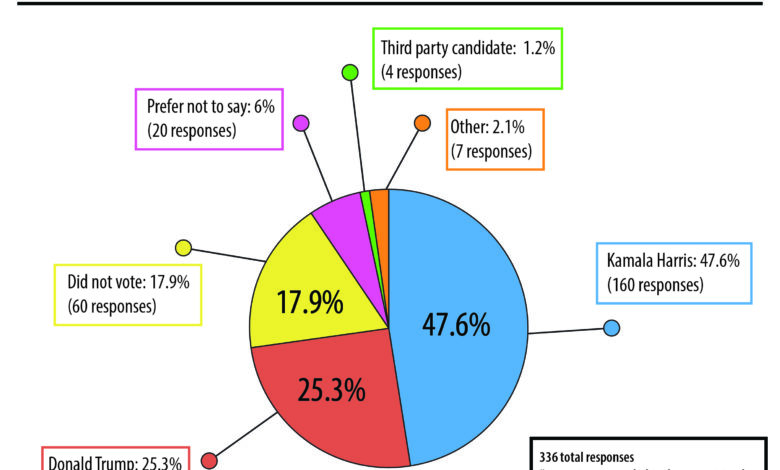
What factors influence college-student voters?
By Hannah Newman
With the election having a pivotal role in college students’ futures, marketing professor Sergei Kuharsky had his students develop a survey about the factors that influence college voters.
Students in his class had about a week to market the survey after the election to cross-analyze the components they thought explained the reasoning behind college students’ votes.
“[The goal is] to be smart consumers of research in their business careers and that they look at things with understanding that results are the end of a series of dominoes,” said Kuharsky. “If the dominoes aren’t set up correctly, you can’t necessarily trust the results.”
Junior marketing major Reylan Alexis said, “We’ve seen a pretty polarizing campaign trail from both sides over the past year. And you can kind of get lost in terms of the cultural aspect of it.”
There were 38 students among two classes in charge of sending the survey for answers from any enrolled undergraduate, not just Rider students, to get a unique perspective.
The first two questions asked the surveyor’s birth year and if they are enrolled as an undergraduate student. If the surveyor did not fall in the parameters of a college-aged student currently enrolled in a university, they could not continue with the survey.
The survey was completed by 336 students; 267 said they voted while 69 did not.
The survey indicated 160 students voted for Vice President Kamala Harris and 85 voted for eventual President-elect Donald Trump. The rest either voted for a third-party candidate, preferred not to answer or did not vote in the 2024 election.
With the immensely controversial topics the election provoked, the most important issues that influenced college student voting varied; however, the top two conflicts were the economy, with 74 votes, and abortion and women’s reproductive rights, with 72 votes.
Senior marketing major Ewelina Krokos said, “The results [of what was the most important issue] didn’t really surprise me. I think people were vocal about their beliefs, and it kind of just showed through the data that there was kind of an equal representation on both issues.”
Considering the amount of celebrity endorsement and involvement in the election, the survey also showed that 172 students followed a celebrity that expressed a political view, but only four admitted to being highly influenced by it.
“The last thing anyone wants to admit is that they were influenced by anyone. America is a pretty individualistic country,” said Alexis. “I do think that [celebrities] had at least somewhat of an impact, especially thinking about, like, how much both candidates were willing to put out celebrity endorsements, and the Harris campaign had all those concerts, and the Trump campaign was at UFC events.”
The survey also indicated 99 voter students felt unsure of what educational resources were available on college campuses.
Krokos felt that the best way to share voting resources would be via email; however, Rider is known for spamming student’s inboxes with things that do not pertain to every student, deterring students from engaging with the content.
“I do think the inbox is the most personal touch to reach out about something, but at the same time, from Rider’s emails, it’s getting to a point where they are sending a lot of emails that aren’t relevant,” said Krokos.
Although there were many different versatile components to what influences college-age voters, students in Sergei’s class will now take what they feel are the most interesting parts and cross-analyze the data even further for their final project.
According to senior marketing major Autumn Agliata, the purpose of the study is to examine how college students of different genders prioritized key issues during the 2024 presidential election and to assess whether these priorities are influenced by gender-specific values, beliefs and social perspectives.
“I plan to use the information, specifically the categories of gender and issues most important to you, to cross analyze and assess whether the priorities are influenced by gender specific values, beliefs and morals,” said Agliata.


